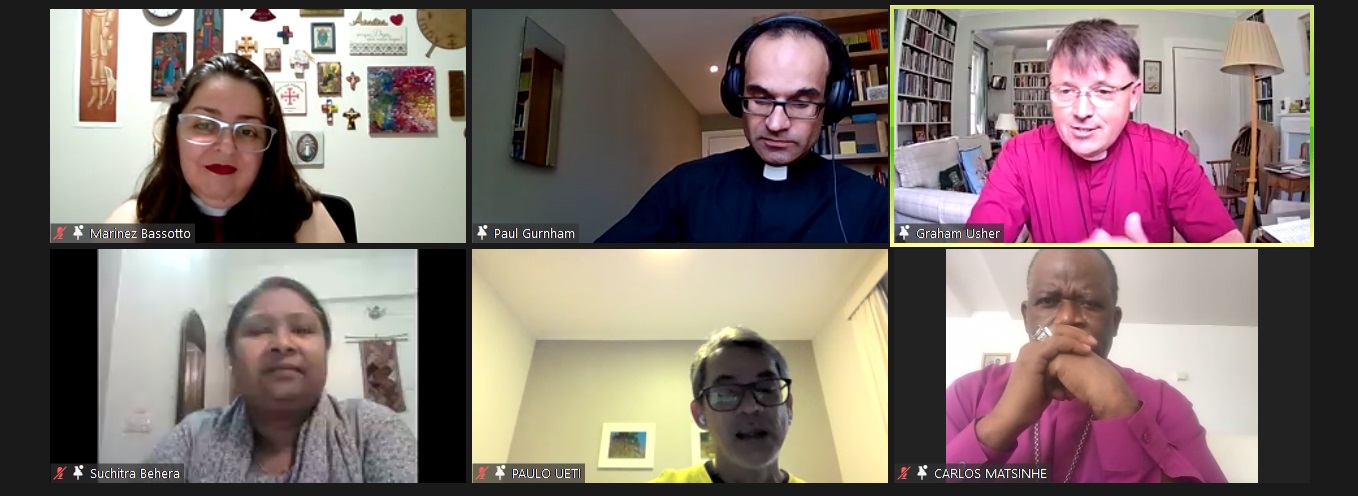The Cry of Creation: Creativity in the Church

The final session of For Such A Time As This, USPG’s 2021 conference, focused on the climate and ecological emergency and creative responses of the Church to care for creation.
The Cry of Creation: Creativity in the Church opened with an act of worship from the Oxford Diocesan Board of Schools, featuring schoolchildren discussing their favourite things about creation and what individuals can do to be more eco-friendly.
Suchitra Behera, theologian and international development practitioner in the Diocese of Barishal in Bangladesh, presented a Bible study looking at passages from Romans, Jeremiah, Joel and the Psalms, speaking to the liberation of creation from decay. Suchitra asked, “Are we truly discerning how God wishes us to act in the context of climate change? How can we turn the groaning of creation into effective public protest?” She also commented on the relationship between humanity and the other species that inhabit the Earth, as well as discussing how we oppress the Earth. Suchitra identified potential oppressive forces that humanity has unleashed on the planet, such as deforestation, urbanisation, greed and a focus on economic growth no matter the cost. Suchitra also drew comparisons between the groaning of creation and the pain experienced by women during childbirth.
The Rt Rev'd Carlos Simão Matsinhe, Bishop of Lebombo in Mozambique, focused on the notion of redemption in his contribution to this session. Bishop Matsinhe said, “In the creation story, humanity is the last species to appear. This shows how much God values the rest of creations, prioritising their creation over ours. As a global Church, we need to support the parts of the Body of Christ across the world who are suffering from the effects of climate change. Only by caring for both creation and each other can we achieve redemption”.
The Rt Rev’d Marinez Rosa dos Santos Bassotto, Bishop of the Amazon, spoke to the Brazilian government’s inaction on the climate and ecological crisis, what the Diocese of the Amazon is doing to combat this and how she envisions the future of Brazil. Bishop Bassotto said, “The government has used the pandemic as an excuse to pass legislation allowing those working in agribusiness, mining and logging to increase their activities. This leads to increased pollution and has a detrimental impact on the biodiversity of places such as the Amazon. Indigenous people are disproportionately affected by this environmental damage, as they live in areas rich with natural resources and are persecuted if they voice any opposition to such ecological destruction. The Anglican Diocese of the Amazon is deeply committed to protecting the rights of indigenous people in Brazil. As a result, the Diocese coordinates initiatives such as our course for Social Educators in the Amazon, which trains local leaders to advocate for dignity, justice and peace, and the Planting Lives programme – an initiative to distribute seedlings of native Amazon trees for reforestation. We believe that it is the role of the Church to raise its voice in defence of indigenous people; the exploitation of natural resources not only devastates the environment, but it also harms the bodies and souls of indigenous people”.
The Rt Rev’d Graham Usher, Bishop of Norwich, emphasised the urgency of taking action on climate justice. He said, “This year is a Kairos moment, as the UK hosts the COP26 conference in November. We live in worrying times, with climate events increasingly affecting countries in the Global North; yet, people in the Global South have long known the impact of climate change, as it drives resource scarcity and fuels conflict in certain countries. We need to see a huge effort on a global scale if we are to mitigate the effects of climate change”. Bishop Usher urged those in attendance to “Listen, as listening is the hallmark of a church focused on ecological justice. We need to listen to the cry of creation, to the voices of the dispossessed”. He also noted the importance of lament, saying, “The Church must begin its journey towards climate justice with lament. We must live more sustainably, recognise the importance of individual as well as collective actions, and develop an expansive theology of creation care. We are linked to the whole of creation and responding to the climate emergency is not a luxury, it is an imperative for the mission of God’s church”.
Attendees asked questions about the intergenerational nature of action on the climate and ecological emergency, the difference between climate responses from churches and schools, and how churches can better integrate ecological justice into discussions around spirituality and theology.
The Rev’d Duncan Dormor drew the conference to a close, saying, “The last few days have been inspiring, prophetic and challenging. At the heart of our faith, we are a people who gather together as one body. We have come together at this conference seeking God’s love and power, so that we may respond more fully to His call on our lives wherever we may be”.
Speakers included: Suchitra Behera, theologian and international development practitioner in the Diocese of Barishal, the Rt Rev'd Carlos Simão Matsinhe, Bishop of Lebombo in Mozambique, the Rt Rev’d Marinez Rosa dos Santos Bassotto, Bishop of the Amazon, and the Rt Rev’d Graham Usher, Bishop of Norwich.
To read more about the other conference sessions and to watch the recordings visit the links below.
Solidarity and global mission in the Age of Covid
Prayer, Presence and Provision in the Pandemic
Racial Justice: Recovering Spiritualities, Restoring Justice
